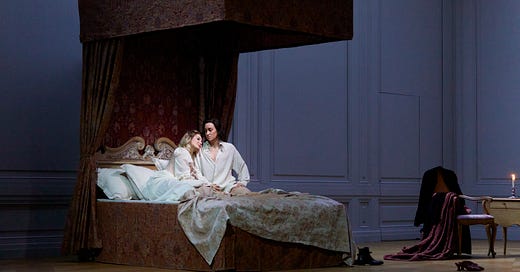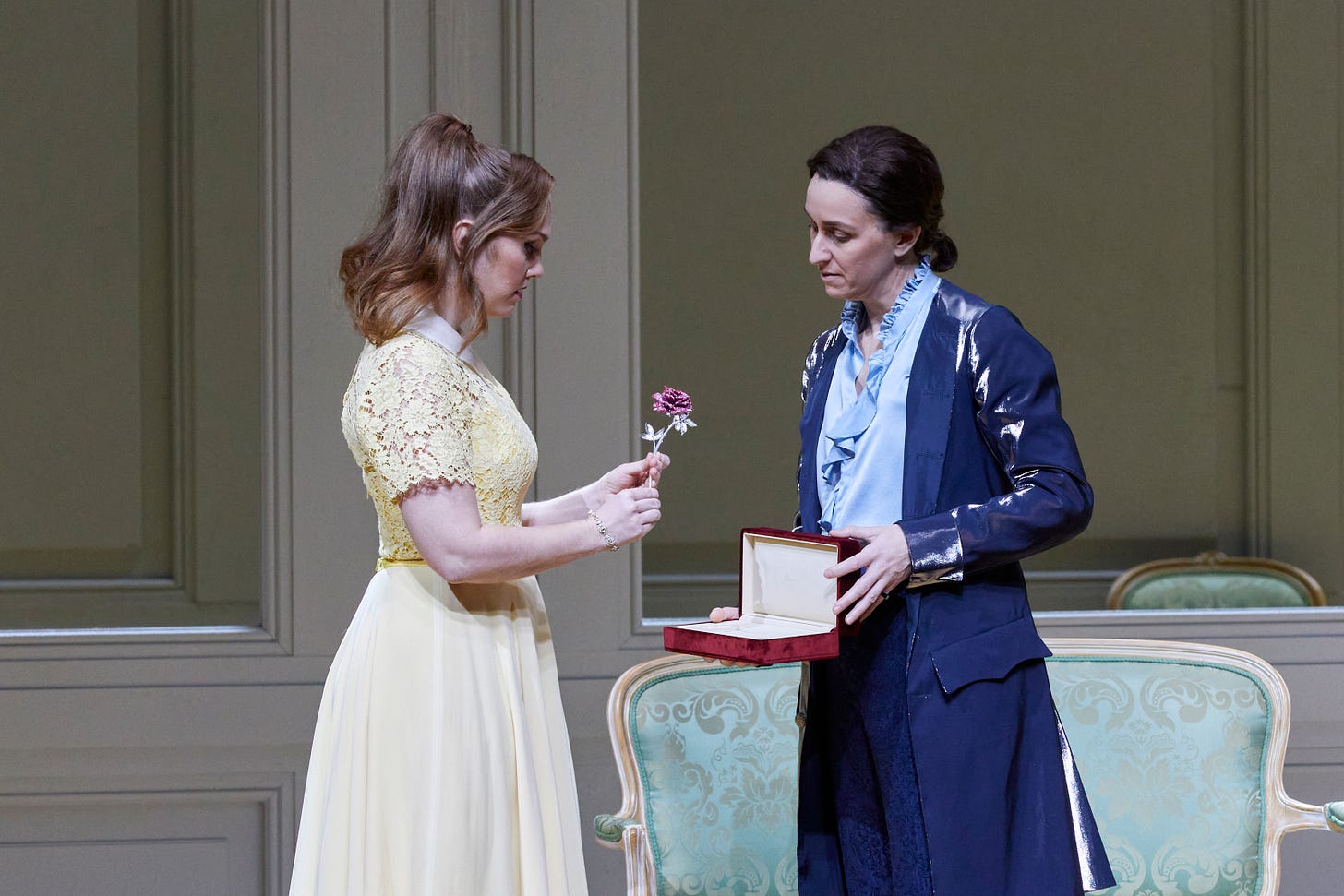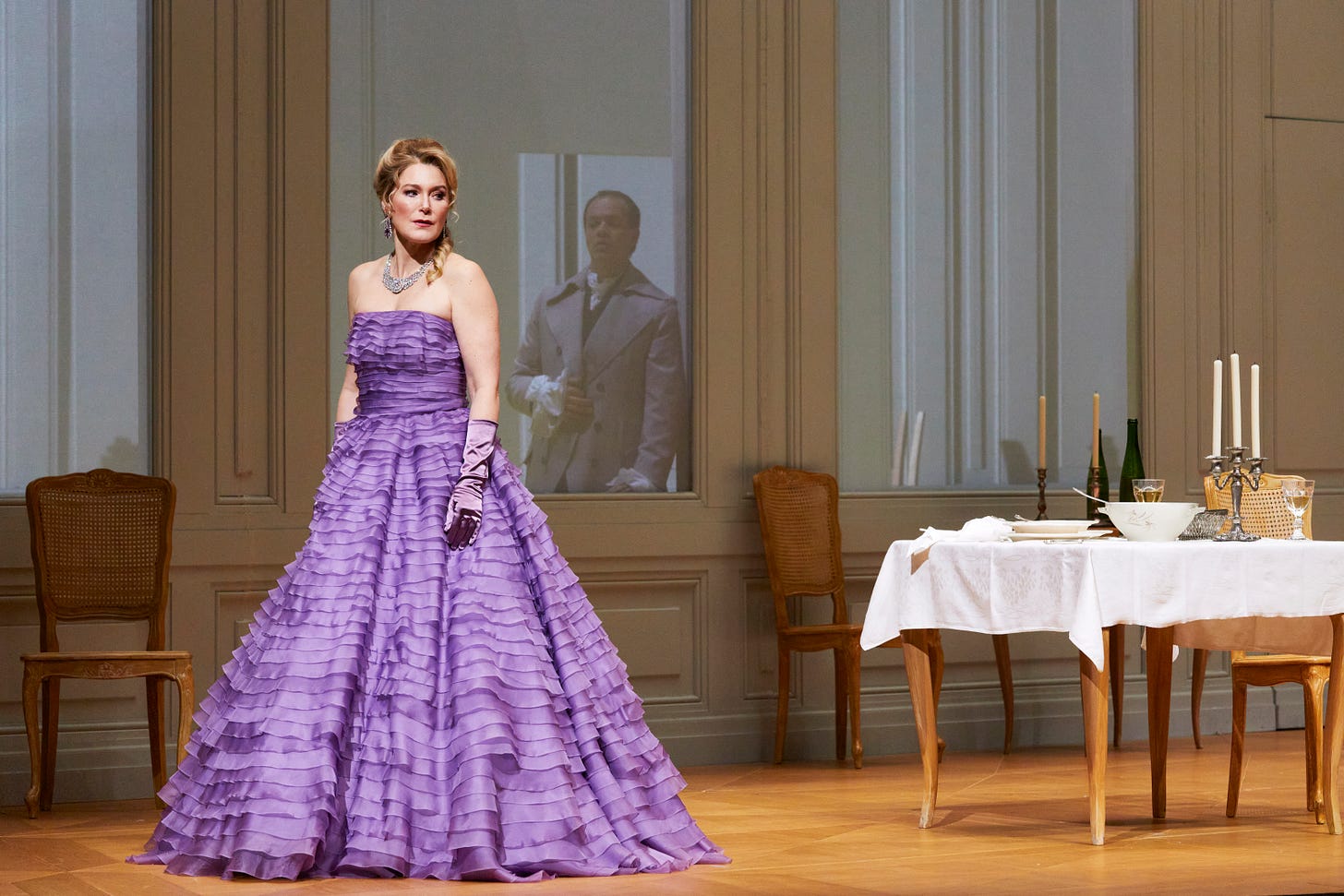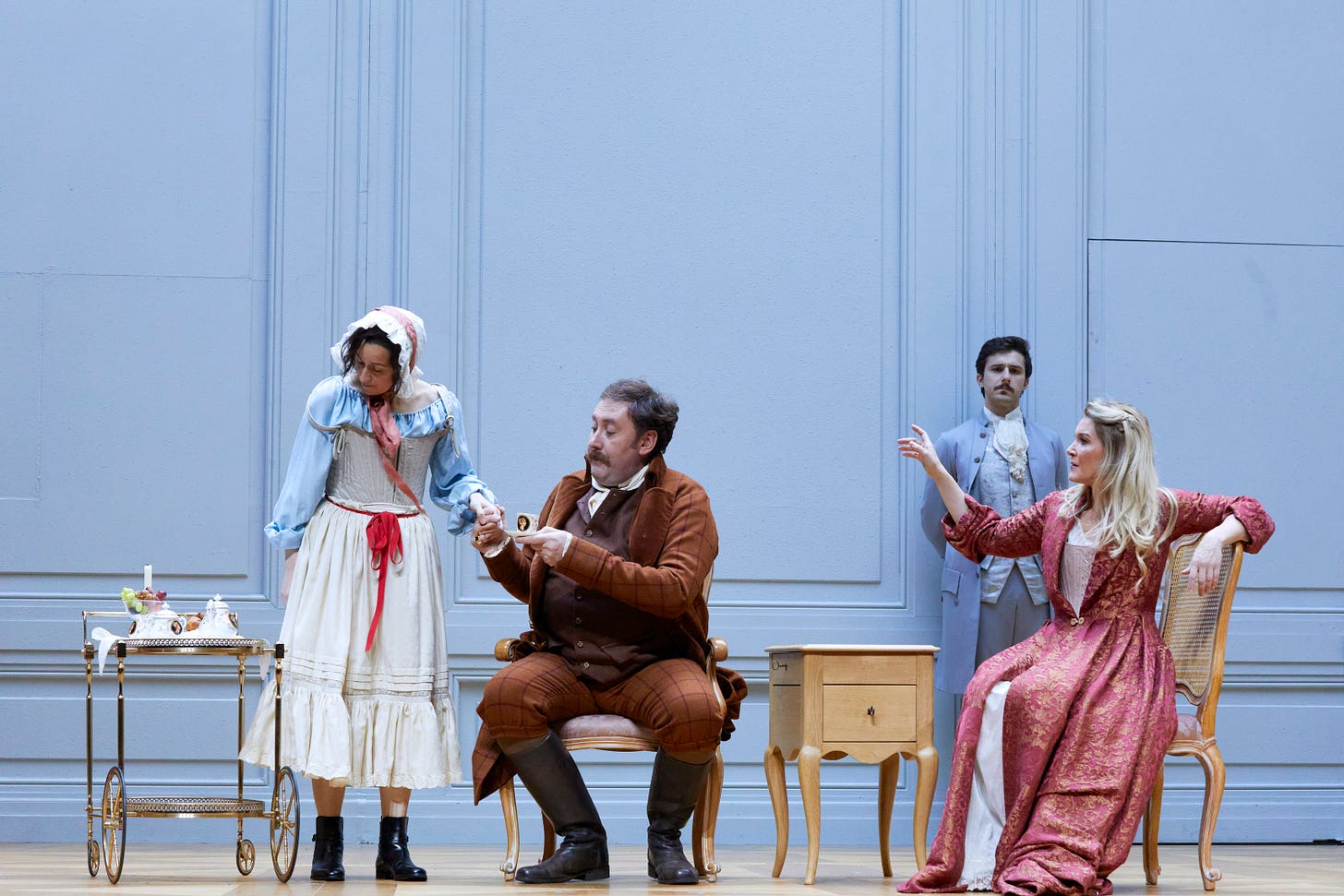Christoph Waltz's Rosenkavalier Waltzes
The Hollywood actor-director restages his 2014 Antwerp production in Geneva
“Wie Du warst” Maria Bengtsson as the Marschallin, Michele Losier as Octavian Picture by Magali Dougados
This is a slightly abridged and edited version, published for the first time in the original English which appears by kind permission of Dr Ulrich Ruhnke, editor of the German Oper! magazine, where it first appeared in translation.
Nearly 10 years have passed since the Viennese-born Hollywood actor Christoph Waltz - Inglourious Basterds, Django Unchained - made his debut as an opera director with Der Rosenkavalier in Antwerp.
Now, with a different costume designer, Carla Teti, but the same scenographer, Annette Murschetz, Waltz has staged a new Rosenkavalier for Geneva’s Grand Théâtre, based on his Flanders Opera original. Murschetz’s set – the unadorned walls of a public building repurposed for each of the three Viennese locations – was notable for its Spartan austerity, one of the reasons, perhaps, why the staging was rejected by London’s Royal Opera House, which had co-commissioned it.
Even in its Geneva re-incarnation, Waltz’s Rosenkavalier would probably not satisfy a London audience accustomed to the extravagances of previous stagings by Luchino Visconti (1966) and John Schlesinger (1984). But Waltz’s meticulous direction is remarkable compensation, especially in an era when conceptual theatre is king. His Personenregie and crowd scenes are clearly the result of an intensive, painstaking period of rehearsal, incompatible with the requirements for regular revival in an international house.
Waltz takes his inspiration above all from Hofmannsthal’s text and Strauss’s music. Indeed he embraces the authors’ taste for time-travelling anachronisms, making clear that the librettist’s language is more fantasy than historically authentic, while Strauss’s music plays fast and loose with stylistic references to his (unrelated) Viennese namesakes of the preceding century.
Presentation of the Silver Rose: Melissa Petit’s ethereal Sophie, Losier’s convincingly boyish Octavian Picture by Magali Dougados
If the clothes and bedchamber furniture chosen by Waltz for the opening act hint at the Hapsburg golden age of Maria Theresia, by the time we reach the nouveau riche milieu of Faninal’s Stadtpalais in Act 2 the world has moved on to the 20th century, with Sophie (the exquisite, silver-toned Melissa Petit) wearing a yellow dress from the 1940s or 50s, while her father (Bo Skovhus, deluxe casting) sports a coat with gold patterned lapels suggesting a homage to Gustav Klimt.
Waltz may not spring many surprises, but his casting of Giulia Bolcato as an unusually attractive 20-something Marianne (Sophie’s companion here, rather than her governess) is the source of one of his best visual jokes: when Ochs arrives in Act 2, he wants to hand the Rose presentation case not to Sophie, his betrothed, but to Marianne - who promptly points across the stage to its real dedicatee. This may contradict Ochs’s apparent revulsion for the chaperone in the text, but it’s a laugh-out-loud gag. Bolcato - in another departure from tradition - sings the role with bright and youthful tone, a change from the ageing maids-of-all-work invariably assigned the duenna’s role.
Bengtsson’s aristocratic Marschallin, “stunning in Carla Teti’s lavender ball-gown” Picture by Magali Dougados
This is typical of the care and seriousness-of-purpose Waltz lavishes on Strauss’s “comedy for music”. His handling of the Octavian-Marschallin relationship (Strauss’s response to the Cherubino-Contessa flirtation in Mozart’s Figaro) is penetrating and many-layered, thanks to his work with Michele Losier’s ‘rose-knight’ and Maria Bengtsson’s Marie-Thérèse. The latter is a survivor from the Antwerp staging, but her interpretation has deepened and grown. Since 2014 she has starred in Klaus Guth’s and Jan-Philipp Gloger’s productions at Oper Frankfurt and Dutch National Opera. Tall, blonde and aristocratic, the Swedish soprano looks stunning in Teti’s lavender ball-gown for her appearance in Murchetz’s spacious, somewhat clinical “g’meines Beisl”. She sings Strauss’s notes and declaims Hofmannsthal’s words with the poise of a great Viennese lady, relishing the sarcasm of her dismissal of Ochs. Even if her timbre lacks the “morbidezza” of a Fleming or a Harteros, she is one of the most complete and captivating Marschallins before the public today, making light work of the vocal challenges.
Losier’s convincingly boyish Octavian begins the evening strenuously, but warms to the task in Act 2. By Act 3 she is in her stride, deliciously awkward in her double-travesty ‘Mariandl’ impersonation. She then blends gloriously in the climactic trio, before duetting ravishingly with Petit’s ethereal Sophie.
Ochs auf Lerchenau (Matthew Rose) flirts with “Mariandl” (Losier dressed as a maid) while the Marschallin (Bengtsson) looks on Picture by Magali Dougados
Matthew Rose is already a seasoned Ochs - closer to Strauss’s “Don Juan-Schönheit” than many of the desiccated old roués who specialize in the role. Wisely, he does not attempt an authentic Viennese accent, which may restrict his success in the German-speaking world, but he sings and plays the part with the youthful vigour Strauss and Hofmannsthal surely intended - even if the Baron’s behaviour merits his come-uppance in the post-Me-Too era.
Ochs’s unmasking is the highlight of Waltz’s direction: as stage-managed by the Italian intriguers (Thomas Blondelle and Ezgi Kutlu), with five lively children wreaking the havoc of three times as many, the “Wienerische Maskerad” culminates in a meticulously choreographed Prügelszene of organized chaos. So Waltz springs a surprise at the end after all.








I was never fond of the Schlesinger ROH production. A little OTT for me. I’m probably one of the few that enjoyed the Carsen production. It was interesting to have seen the production at ROH and the Met. Two very different houses. Different experience of the same production. I think I would have enjoyed this production. Looking forward to Elektra in a couple of weeks. Happy New Year. 🥂🎉
Wish I’d seen this production, but delighted you did ( for your readers ! ). happy New Year, dear Hugh, and continue your wonderful Operalogues ! Gillian 🎭🍾💕🥳